Module8Differenthabits学案
外研版英语七年级上册Module 8 Different habits Unit 3 language in use导学案设计

Module 8 different HabitsUnit 3 language in use南流中学七年级英语备课组一、学习目标:1、进一步理解always ,usually ,often ,never这四个频度副词。
2、熟练应用动词第三人称单数。
3、形容词性物主代词与人称代词的区别应用。
二、学习重难点:1、熟练应用动词第三人称单数。
2、形容词性物主代词与人称代词的区别应用。
.三、导学过程:(Teaching Procedures)Part I:Work in pairs and ask questions.●Ask one or two students the question :Do you watch football? Elicit:Yes, I do./No, Idon’t.●Choose a student and point to one of the students in the first stage of the activity.Say the student’s nameand what he /she does.●Carry on with other srudents until everyone understands the aim of the activity.●Ask the students to mingle, asking and answering questions.Now write.●Ask the students to write the answers they have heard.Part II:Put the word in brackets in the correct place in the sentence.●Ask the students to do this activity on their own.●Check the answers.Part III:Match the words in Column 1 with the words in Column 2.●Ask the students to do by themselves first, then check with a parter.●Ask the students to call out the answers from the whole class, with onestudent reading a word from Column 1and another student the related word from Column2.Part IV: complete the sentences.●Ask the students to do this individually, then check with a partner.●Ask the students to give the answers as complete sentences.Part V: Write words that go with:●Ask the students to list words they know which could go under the column headings given.●They should do this individually, then share their ideas with a parter.●Call back answers from the whole class, and make lists on the board. Part VI:Around the world: Different habits●Look at the picture and read the information with the class.●Discuss the differences between Chinese and US/UK birthdays. 四.Practice:(一)、单项选择1.Where is ____ present? I want to have a look.A youB yourC him2.We give some flowers to Tony_____ his birthday presents.A whenB asC of with3.On her _____ birthday,Betty doesn’t go to bed darly.A fatherB fathersC father’s4.She loves oranges. They are ____ favourite fruit.A herB sheC his5.We usually ____ English in class.A speakB talkC tell6.Mary always gets up _____ 7:00.A inB onC at7.He znswers the phone and goes out_______.A onceB all onceC at once8.Tom has ______ story books.A lot ofB a lots ofC lots of9.These sports shoes are ______.A myB hisC her10.The twins always wear______ favourite jeans.A theirsB themC their(二)用所给词的正确形式填空。
module8 different habits unit1
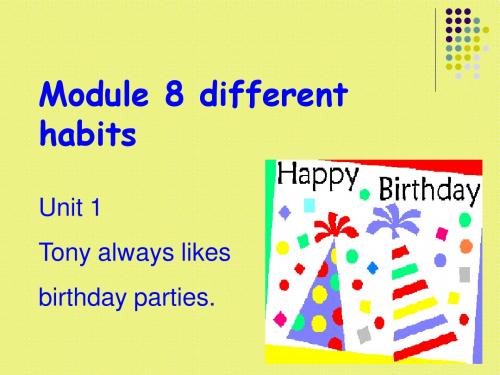
3. Let’s send him a birthday card. ’ 让我们送他一张生日贺卡吧。 让我们送他一张生日贺卡吧。 send sb. sth. = send sth. to sb. 把某物寄( 给某人” “把某物寄(送)给某人” 类似用法的词: 类似用法的词: give sb. sth.=give sth. to sb. 给某人某物” “给某人某物” buy sb. sth.=buy sth. for sb. 给某人买某物” “给某人买某物” make sb. sth.=make sth. for sb.
1.
usually My aunt makes a cake. (usually) alway s My aunt sends cards. (always)
2.
never 3.They send presents. (never)
Miss Chen likes tea very much. She always drinks tea in the afternoon.
1、我们通常送他一张生日卡片。 、我们通常送他一张生日卡片。 We usually send him a birthday card. We usually send a birthday card to him . 2、妈妈为她做了一个蛋糕。 、妈妈为她做了一个蛋糕。 一个蛋糕 Mother makes her a cake. Mother makes a cake for her. 3、他给我2份礼物。 、他给我 份礼物 份礼物。 He gives me two presents . He gives two presents to me .
MODULE 8 Different habits教学设计

MODULE 8 Different habitsPart 1 Teaching Design第一部分 教学设计Unit 1 Tony always likes birthday parties.■Warming upGood morning, class! Do you like to have a birthday party? How is your birthday party like? On my birthday party, my family buy me a big and nice birthday cake. My sisters and brothers give me birthday presents. They give me CDs because I often listen to music. They give me necklaces because I always like beautiful little things. My friends usually send me birthday cards or short messages on my birthday. I always feel very happy on my birthday. I never get unhappy on my birthday. What about your birthday? What do your friends give you? How do you feel about your birthday? Let ’s turn to page 48 and study this new lesson together!■Vocabulary and listening1 Match the words with the picture .Here is a nice picture about a birthday party. How do we know this? We get this idea from the picture itself. In this picture, there are five people dancing and laughing. On the table are a birthday cake, a birthday card, two birthday hats and several birthday presents. Please match the Listen to the tape please. You will hear what people do on their birthday. Pay attention to the details. Pay attention to the use of always , usually, often and never . Check (√)what peopleWork with your partner. Tell each other what you always do on your birthday. Do you always have a party? What do you never do on your birthday? Do you never go to the cinema on your birthday?4 Listen and read.Now we are going to listen and read.Betty, Lingling and Daming are discussing about Tony’s birthday. What does Lingling think about sending Tony a birthday card? What does betty say about giving Tony a computer game? Listen carefully.Now let’s go on to read the conversation. While reading try to cut(断句)/ the sentences into parts, blacken(涂黑)the predicates, shade(加影)the connectives and underline(划线)the expressions. Now write all the expressions in your Expression Book.5 Check(√)the true sentences.From the above conversation, what do you learn about Tony’s birthday and Tony’s habits? Does he always get a birthday card? Does he usually have a cake on his birthday? What about his habits? Does he often listen to music? Does he never watch football match on Sunday? Read the above■Pronunciation and speaking6 listen and repeat.On page 49 there are two sounds and two lines of words. You are going to listen and repeat. PayHe likes music. I like football. She plays the piano. You play the violin. He watches basketball game. We watch Ping-Pong game. Pay attention to the different verbs used in these sentences.8 Say these verbs aloud.Betty eats an egg. Lingling gets a present. Daming likes music. Betty makes a cake. Tony drinksmilk. Lingling plays the piano. Daming loves football. She reads books. He listens to the radio. She does homework. He goes to concerts. She watches volleyball game. He washes clothes. She finishes her homework. Pay attention to the different verbs used in these sentences. Say theseNow listen and check(√).9 Work in groups of three or four. Check your answers to Activity 2.Now work in groups of three or four people. Check your answers to Activity 2 with yourUnit 2 His birthday present is a cinema ticket.■Warming upHi, everyone! Tomorrow is my mother’s birthday. What present should I give her? My mother likes listening to songs. She sings well, too. But she never goes to concerts. She often watches TV series. She likes clothes and she usually wears silk shirts. She never goes to the cinema and she never watches football games.■Vocabulary and reading1 Look at the pictures. Choose your birthday present.It’s so great! There are so many birthday presents here. The first one is a cinema ticket. But my mother never goes to the cinema. So I shouldn’t give her a cinema ticket. What about the seventh one? It is a silk shirt. Yes, it is a great idea to give my mother a silk shirt on her birthday. She oftenOn page 50 is a passage about choosing birthday presents. Read the passage. While reading try to cut(断句)/ the sentences into parts, blacken(涂黑)the predicates, shade(加影)the connectives and underline(划线)the expressions.Now write all the expressions in your Expression Book.3 Complete the sentences.The passage before tells us different habits of different people. We all learn a lot about their habits. Daming’s uncle likes reading. Daming’s mother likes candy and clothes. Tony’s sister likes music and singing. Lingling’s father likes football match and novels. Betty’s aunt and uncle like music and watching TV. Now, let’s choose presents for them. Can you think of the best present for each4 Write these sentences with’(apostrophe).Betty’s brother likes music. My brother likes football. Lingling’s mother likes reading. My mother likes singing. Tony’s sister often goes to concerts. My sister usually goes to the cinema. Write6 Work in pairs. Talk about things you like and do.Work with your partner. Just talk about things you like and do. Say as many things as you can.Unit 3 Language in use■GrammarHi, class. Language is something for use, for communication. And language can be learned in use, in communication.Today we shall learn about the English language in use. We shall learn about English Grammar1 Work in pairs and ask questions.2 Put the word in brackets in the correct place in the sentence.I go to the concerts. I often go to the concerts. She play the piano. She usually plays the piano. He goes to bed at 10:00. He always goes to bed at 10:00. We watch football games on TV. We never watch football games on TV. Make sentences like the above examples I give you. Pay attention to the correct place of often, usually, always and never. Put the words in the correct places in the3 Match the words in Column 1 with the words in Column 2.I am a student. This is my book. You are a doctor. This is your hospital. He is a teacher. I am his student. She is my mother. I am her daughter. What’s it in their classroom? It is a TV. Its colour is black. We are having our dinner now. Do you know how to use the following words now? Match4 Complete the sentences.I like Tom Hanks. He’s my favourite actor. She likes Gone with the wind. It’s her favourite film. We often listen to music. There are a lot of CDs in my home. Let’s buy a present for Betty. It’s her birthday. Tony’s grandparents live in the UK. Their home is in London. Hello, what’s your■Vocabulary5 Write words that go with:Use your imagination and try to write as many words as possible. For example, bananas, noodles,■Around the worldWhat do people give as birthday presents in the UK and the USA? Do they often open theirpresents at once? Let’s go around the world on page 53.■Module task →Choosing a birthday present6 Think of someone in your family. Write a description of him / her.Hi, class! I would like you to think of someone in your family and write a description of him or her. What does he or she like? What does he or she always do? What does he or she usually do?Work with your partner. Please show your description to your partner. What do you think of each other’s description? What can you learn from each other’s description? Choose a birthday present for the person you write. Will he or she like your present? Does your present suit him or her?。
module8《differenthabits》复习教案(外研版初一上)
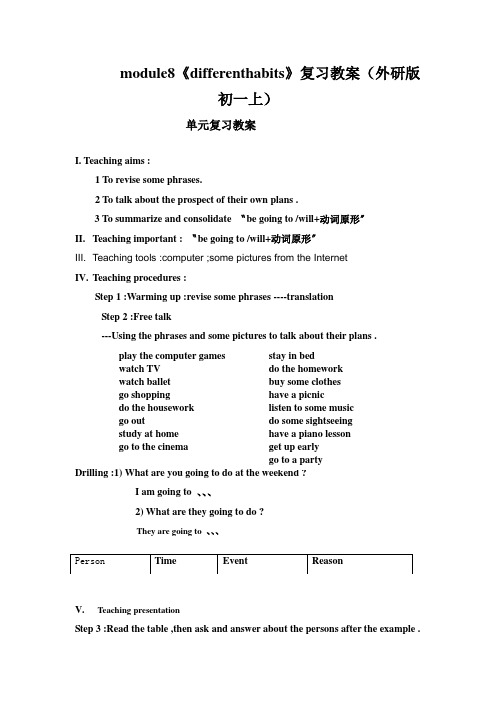
module8《differenthabits 》复习教案(外研版初一上)单元复习教案I. Teaching aims :1 To revise some phrases.2 To talk about the prospect of their own plans .3 To summarize and consolidate 〝be going to /will+动词原形〞 II. Teaching important : 〝be going to /will+动词原形〞 III. Teaching tools :computer ;some pictures from the Internet IV. Teaching procedures :Step 1 :Warming up :revise some phrases ----translation Step 2 :Free talk---Using the phrases and some pictures to talk about their plans .I am going to 、、、2) What are they going to do ?They are going to 、、、V. Teaching presentationStep 3 :Read the table ,then ask and answer about the persons after the example .e.g A :What’s Daming’s aunt going to do next Sunday ?B :She’s going to go to the zoo .A :Why is she going to go to the zoo ?B : Because she likes animals .Step 4 :Listen to the tape and check what Lingling and Tony are going to do ?Step 5 : Using will /won’t to write sentences about the future .e.g The roads /be /very crowdedThe roads will be very crowded .1.So car journeys /be /easy .2.Fuel /be /expensive .3.So international travel / not be /very cheap .puters and machines /do /all the heavy and boring work .5.So we /have /more time to play and have holidays .nguage practice /consolidation .Step 6:Do some exercises and check themVII.Summary and homework。
外研版英语七年级上册Module 8 Different habits全模块英文教案附教学资源

Module 8 Different habits全模块教案II. Teaching materials analyzing教材分析模块8以Different habits为话题,围绕如何为他人挑选生日礼物展开听、说、读、写的语言实践活动,通过3个单元的学与练,旨在让学生通过这一学习与体验的过程,引导学生乐于交友,培养健康向上的品格。
同时能够就生日礼物的选择进行提问与回答,能够熟练使用频度副词。
Unit 1要求学生通过听、读、说的练习,学会谈论为生日所做的准备活动。
Vocabulary and Listening包括5部分。
Part 1要求学生根据图片找出与之相对应的单词,通过这一部分的练习,使学生在复习已有知识的基础上,学习本单元出现的语言知识,为相关语言技能的训练奠定基础;Part 2 要求学生根据一段听力材料,初步了解频度副词的使用;Part 3要求学生俩俩对话,说说自己在生日那天的具体活动,并且要求使用频度副词;Part 4要求学生通过听力练习,正确捕捉和判断听力材料中的信息,同时也为“谈论选择生日礼物”作好准备。
Part 5要求学生在上一个活动的基础上,选择符合对话内容的信息。
Pronunciation and speaking 包括4部分。
Part 6 帮助学生掌握辅音[h],[r]的发音规律;Part 7 训练学生使用正确的语音;Part 8 要求学生大声读单词,掌握动词第三人称单数的正确读音;Part 9 要求学生以小组对话的形式,来检验活动2的答案,将上述所学运用到实际交往活动。
Unit 2 围绕“选择生日礼物”展开,包括介绍不同人物的不同爱好。
V ocabulary and reading 包括3部分。
Part 1要求学生通过图片选择自己的生日礼物,借以激活学生已有的相关知识储备,并熟悉本单元基本的语言知识;Part 2要求学生阅读短文,选出对应的生日礼物;Part 3要求学生根据短文内容完成句子,借以考查学生的理解能力。
外研版英语七年级上册Module 8 Different habits Unit 1 Tony always likes birthday parties导学案设计
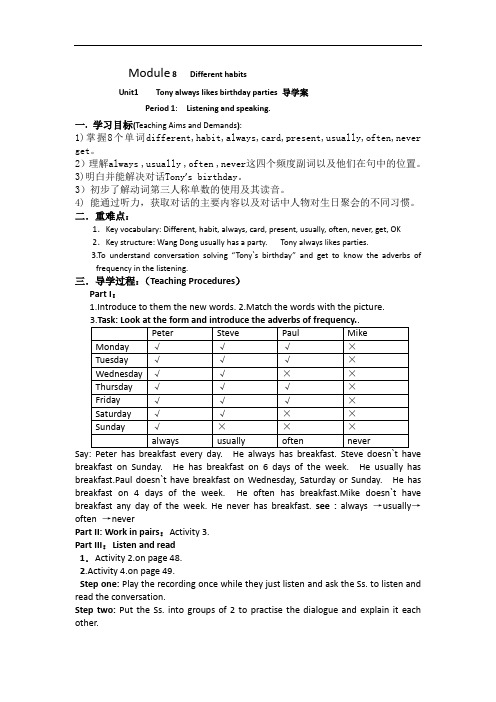
Module8 Different habitsUnit1 Tony always likes birthday parties 导学案Period 1: Listening and speaking.一.学习目标(Teaching Aims and Demands):1)掌握8个单词different,habit,always,card,present,usually,often,never get。
2)理解always ,usually ,often ,never这四个频度副词以及他们在句中的位置。
3)明白并能解决对话Tony’s birthday。
3)初步了解动词第三人称单数的使用及其读音。
4) 能通过听力,获取对话的主要内容以及对话中人物对生日聚会的不同习惯。
二.重难点:1.Key vocabulary: Different, habit, always, card, present, usually, often, never, get, OK2.Key structure: Wang Dong usually has a party. Tony always likes parties.3.To understand conversation solving “Tony`s birthday”and get to know the adverbs offrequency in the listening.三.导学过程:(Teaching Procedures)Part I:1.Introduce to them the new words.2.Match the words with the picture.breakfast on Sunday. He has breakfast on 6 days of the week. He usually has breakfast.Paul doesn`t have breakfast on Wednesday, Saturday or Sunday. He has breakfast on 4 days of the week. He often has breakfast.Mike doesn`t have breakfast any day of the week. He never has breakfast. see :always→usually→often →neverPart II:Work in pairs:Activity 3.Part III:Listen and read1.Activity 2.on page 48.2.Activity 4.on page 49.Step one: Play the recording once while they just listen and ask the Ss. to listen and read the conversation.Step two: Put the Ss. into groups of 2 to practise the dialogue and explain it each other.3.activity 5 on page 49Step one: Play the recording once while they just listen.Step two:Play the recording once again for them to Check the answers with a partner..Step three : Ask different students to read the correct sentences..四.训练设计:(一).单项选择()1.---_____she ______at six every day? ---No, she doesn’t.A. Does, get upB. Does, gets upC. Is, get upD. Is, getting up( ) 2. Ben likes swimming very much, but he _______ running.A. doesn’t likeB. not likeC. isn’t likeD. don’t like( ) 3. What about ______ a picnic?A. haveB. to haveC. havingD. has( ) 4. What ____the girl’s names?A. amB. beC. isD. are()5. ---_____maps are there ? --- There are eight.A. WhatB. How manyC. WhereD. Who( ) 6. Let’s make a plane _______him.A. toB. atC. forD. of( ) 7. They _______ at school from Monday to Friday.A. is oftenB. often isC. are oftenD. often are( ) 8. We usually do _______ homework in the evening.A. weB. one’sC. meD. our(二)、根据句意及首字母填空:1.Different people have different h_________.2.Tony _____________(从不)likes watching TV.3.Match the words ___________(和)the pictures.4.Jim ____________(通常)washes his clothes.5.What present do you want c__________?(三)句型转换:1. It’s an old box.(改为一般疑问句) an old box?2. They are some young women.(改为单数形式) a young .3. We can see six bags of rice in the car.(就划线部分提问)of rice you see in the car?4. Please give him a new book. (同义句) Please _______a new book _____ him.5. He often likes birthday parties. (否定句) He ______often ______birthday parties.(四)用所给动词的正确形式填空:1.I ______ books, but he _______TV. (like)2.My sister _____(not go) to school on Saturday. She often ____(stay) at home. 3.One of the students ____(be) English.4.My father _____(not go) to football matches. He _____(watch) TV.五. 反思小结:。
初一上 Module8 Different habits语法课学案

初一上Module8 Different habits学案(四)语法课:一般现在时一、学习目标:1、体会并掌握一般现在时的意义和用法2、熟悉一般现在时第三人称动词的变化规则,并我掌握单词变化后的读音。
二、学习难点:一般现在时动词第三人称单数形式三、学习过程(一)假设生日情境呈现一般现在时的句型:(可与本模块相联系的句型)1.Today is my birthday.2.I often get presents on my birthday.3. My son usually sends me cards.4.My husband always makes a cake for my birthday.5. I never have a party.6.My father give me some books every year.(读句型,体会句型表达的意义,小组内讨论出这类句型表达的意义:___________________.这类句型是一般现在时。
这类句型经常带有标志词:_________________________________ 标志词的位置(课后可参考p52. part2)一般现在时的谓语动词的构成形式:(1)主语是第三人称时,动词是____________________(2)其他人称是,动词是______________________________.)(二)精学语法规则:1、自学开始动词第三人称单数变化规则:①一般情况加s .例: help _______, know________②以字母s, x, ch, sh或有些以o结尾的动词加es .例:teach_________, wash__________go _______ do ___________③以辅音字母加y结尾的动词,变y为i ,再加es. 例:carry ______ fly __________④特殊词例外:例:be-is , have -has2、竞赛开始:写出下列动词的第三人称单数play_______ , say_______, worry_______, guess_________, fix ________, have________,fly_________, work_______ , are_________, do________ ,eat ________ ,give__________,like_________, read________, watch________, wash_______, finish_______,drink______.(竞赛结束后读词,总结变化后的读音)3.归纳动词第三人称单数的读音:(1) -s时:轻辅音后读/ / , 浊辅音、元音后读/ /.(2)-es/ies时,读/ /.(齐读单词,体会读音)(三)一般现在时的专项训练:用动词适当形式填空1.He often ________(help) me with my English.2.She never _________(wear) jeans.3.Jenny and Danny usually ______(play) games in the afternoon4.Tom _______(go)to school early every morning.5.We________(do) her homework every night.6.Mum usually _______(buy) new clothes for me .7.His mother ________(study) English every day.8.My grandma always ________(watch)TV at night.9.She often _________(get) up late in the morning.10.They _________(be) teachers.11.Jim ________(have ) many friends.(独立做,小组核对答案后,读句子,读三单动词,体会读音)(四)一般现在时的一般疑问句,肯定否定回答和否定句1、根据(三)中的句型1,2,3示范转化2、学生自己转化4,5,63、检测7,8,9,10,11(五)综合应用一般现在时介绍一下你的朋友喜欢的东西和不喜欢的东西,经常干的事或不经常干的事或从来不干的事仿照Unit3 part 6。
Module 8 Different habits
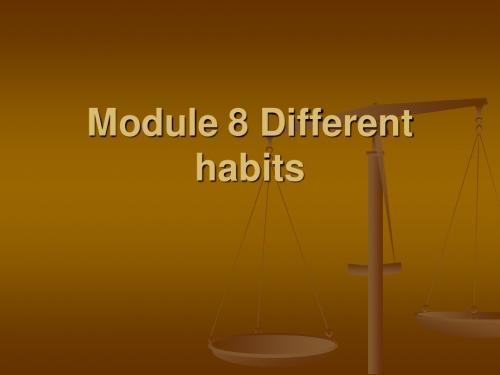
④在以“辅音字母+y”结尾的单词后,将y改为i,再加-es: e.g. try→tries study→studies carry→carries
(1)always adv. 总是,一直,经常,永远 在本模块中出现了几个表示频度的副词。下面我 们将其按动作发生的频度进行排列: always→usually→often→(sometimes)→never 总是 通常 常常 (有时) 从不 这些副词用来表示不确定的时间,表动作的频度。 在句中的位置通常有以下几种:
1.B 考查形容词性的物主代词。首先从第二个空选 答案。姐姐是女性,应用her. 2.D “他们的”用复数人称。 3.B 用a lot of 或lots of。 4.D 考查第三人称单数动词的否定形式,前面用 了助动词,后面用动词原形。 5.B 考查第三人称单数动词的用法,watch后加 es。“看电视”TV前不用冠词。 6.A “喜欢做某事”like doing sth. 主语是he, 就用likes。 7.B 主语是Mr. Green,动词用第三人称单数形 式。 8.B 考查副词在句中的位置。 9.B 考查名词的单、复数。 10.C 考查代词的用法,注意人称与代词的一致。 brother是男性,应用his和him。
4.她的生日礼物是一件新衬衫。 _____ birthday gift is ____ ____ _____. 5.她们最喜欢的衣服是牛仔裤和T-恤衫。 ____ _____ clothes are ____ and _____.
八年级上Unit8教案(激发学生学习兴趣的技巧与实践

作文一、教学课题及目标教学课题:八年级上Unit 8教案(2) 激发学生学习兴趣的技巧与实践教学目标:通过本单元的学习,使学生掌握运用不同的技巧和实践来激发自己的学习兴趣和探能力,培养学生主动学习的意识和习惯。
二、教学重点难点教学重点:激发学生学习兴趣的技巧和实践教学难点:运用所学技巧和实践去探究新知识,培养了解新事物的能力和兴趣。
三、教学内容及时间分配教学内容时间技巧与实践的概念介绍 10分钟利用多媒体展示激发学习兴趣的技巧和实践 20分钟学生根据所学技巧和实践去探究新知识 30分钟讨论总结及作业布置 10分钟四、教学方法1.多媒体展示2.讨论式教学五、教学手段1.讲义、多媒体2. PPT六、教学过程Step 1 技巧与实践的概念介绍(10分钟)学生不同的学习兴趣和探究能力可能需要不同的技巧和实践,教师介绍不同的技巧和实践,如:听故事、互动探究、演讲表达等等。
Step 2 利用多媒体展示激发学习兴趣的技巧和实践(20分钟)利用多媒体展示各种各样激发学习兴趣的技巧和实践,让学生了解不同技巧和实践的特点,同时培养他们的审美和探究能力。
Step 3 学生根据所学技巧和实践去探究新知识(30分钟)老师布置一道新的学习任务,根据我们介绍过的技巧和实践去完成,鼓励学生独立思考、探究,提高其分析、解决问题的能力和兴趣。
Step 4 讨论总结及作业布置(10分钟)学生分享自己在学习过程中采用的技巧和实践,大家一起总结和讨论,获取更多的学习信息,拓展学习视野。
老师对这节课的学习情况进行评价,并布置相关的作业。
七、教学反思通过本堂课的学习,学生们对技巧和实践的概念有了更深刻的理解,并能在实际学习中运用所学的技巧和实践来激发学习兴趣和探究能力。
通过这种探究式学习,学生与实际课堂的学习内容更贴近,更有针对性,更能激发学生的学习兴趣,进一步提高课堂效果,达到教育教学的目的。
Module8DifferenthabitsUnit2教学设计
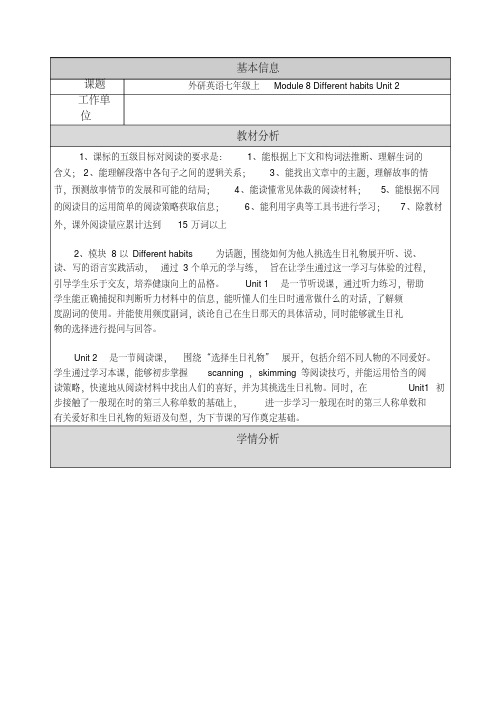
基本信息课题外研英语七年级上Module 8 Different habits Unit 2工作单位教材分析1、课标的五级目标对阅读的要求是:1、能根据上下文和构词法推断、理解生词的含义;2、能理解段落中各句子之间的逻辑关系;3、能找出文章中的主题,理解故事的情节,预测故事情节的发展和可能的结局;4、能读懂常见体裁的阅读材料;5、能根据不同的阅读目的运用简单的阅读策略获取信息;6、能利用字典等工具书进行学习;7、除教材外,课外阅读量应累计达到15万词以上2、模块8以Different habits为话题,围绕如何为他人挑选生日礼物展开听、说、读、写的语言实践活动,通过3个单元的学与练,旨在让学生通过这一学习与体验的过程,引导学生乐于交友,培养健康向上的品格。
Unit 1 是一节听说课,通过听力练习,帮助学生能正确捕捉和判断听力材料中的信息,能听懂人们生日时通常做什么的对话,了解频度副词的使用。
并能使用频度副词,谈论自己在生日那天的具体活动,同时能够就生日礼物的选择进行提问与回答。
Unit 2 是一节阅读课,围绕“选择生日礼物”展开,包括介绍不同人物的不同爱好。
学生通过学习本课,能够初步掌握scanning,skimming等阅读技巧,并能运用恰当的阅读策略,快速地从阅读材料中找出人们的喜好,并为其挑选生日礼物。
同时,在Unit1初步接触了一般现在时的第三人称单数的基础上,进一步学习一般现在时的第三人称单数和有关爱好和生日礼物的短语及句型,为下节课的写作奠定基础。
学情分析我所教学的对象是初一学生(以中等生为主),对英语普遍感兴趣,但有很大的不稳定性,好奇心强,求知欲旺盛,他们学习英语既感到好奇又担忧,希望能得到他人的肯定。
因此我在教学活动中尽量让他们参与到活动中来,有更多的机会来说英语,减少他们的恐惧感,通过学生间的合作学习,降低他们的学习难度,使他们体验到成功的喜悦。
提高他们综合运用语言的能力,使各层次的学生都有所收获。
Module8Differenthabits

Module 8 Different habits一、按要求写出相应的词1.what is(缩写)_______________ 2.are not(缩写)____________________ 3.those(单数)________________ 4.they(形容词性物主代词)___________ 5.no(同音词)________________二、将下列短语译成英语1.她的书包____________________ 2.一位老师______________________ 3.在第三排____________________ 4.你的朋友______________________ 5.他的猫______________________ 6.几岁……______________________ 7.用英语______________________ 8.一个苹果______________________ 9.一幅地图____________________ 10.五辆公共汽车____________________ 三、用适当的代词填空1.That's my schoolbag. Give ________ to ________, please.2.A: Oh, dear! I can't find ________ bike.B: Don't worry. I think I can help ________. Is that bike over there ________?3.A: Dad, we can't carry this bag. It's too heavy. Could you come and help ________?B: Wait a minute. I can help ________ carry it.4.They are your new teachers. Please go and say “hello” to ________.5.Bob is an English boy. ________ father is Mr Brown.四、请选用方框中的词的正确形式完成短文wear, teacher, his, work, like, teach,speakMr. Smith is a 1 from New York. He is now in Beijing. He 2 English in a middle school. He can also 3 a little Chinese. He usually 4 a silk shirt. 5 students like him very much and he 6 teaching them, too. He 7 very hard.五、选择填空1.Is Li Lei ________ school today?A.in B.at C.on D.by2.—Is this ________ cake? —No, it's ________ egg.A.an, an B.a, a C.a, an D.an, a3.This ________ your pen. It ________ my pen.A.are; is B.is; isn't C.are; isn't D.aren't; is4.Where ________ Li Lei and Li Ping?A.am B.is C.aren't D.are5.—What's his name? —I ________ know.A.am not B.don't C.isn't D.aren't6.is a girl. ________ name is Lucy.A.She; Her B.He; He's C.It; It's D.Her; She's7.I don't think it is ________ coat.A.he B.his C.him D.here8.—What's ________ name, please? — ________ name is Li Lei.A.your; My B.my; Your C.your; Your D.my; My 9.—What row are you in? —I'm in ________.A.row one B.one Row C.the Row one D.Row one 10.Are you Chinese ________ Japanese?A.to B.and C.or D.to 11.—My father ________ a new car.—He ________ it very much.A.have; like B.has; likes C.has; like D.have; likes 12.—Are you English or American? — ________.A.Yes, I am B.I'm American C.No, I'm not D.Yes, you are 13.Could I drink ________ water?A.any B.some C.a D.an 14.—Is this a pencil - box? —Yes, ________.A.its B.it is C.is it D.it's 15.Who's that ________ this picture?A.in B.to C.at D.on 16.—Are you Li Ping? — ________.A.Yes, it is B.Yes, I'm C.No, I am D.Yes, I am 17.—Where is Ann? — ________.A.It's here B.I'm here C.He is here D.I don't know 18.This is ________ old jeep.A.my a B.my an C.an my D.my 19.—Is this a book or a map? — ________.A.Yes, it is B.Yes, it's C.No, it isn't D.It's a map 20.They are twins. They look ________.A.same B.like C.after D.the same 六、句型转换1.You can catch that bird.(改为否定句)________ ________ ________ that bird.2.There is some bread for her.(改为一般疑问句)________ ________ ________ bread for her?3.It’s an old box.(改为一般疑问句)________ ________ an old box?4.They are some young women.(改为单数形式)________ ________ a young ________.5.We can see six bags of rice in the car.(就画线部分提问)________ ________ ________ of rice ________ you see in the car?6.Give them some cakes, please.(改写句子,使句意不变)Please give some cakes________ ________.7.She is a Chinese baby.(改为复数形式)________ are Chinese ________.8.He can mend the broken bike.(改为否定句)He ________ ________ the broken bike.9.Li Lei is thirteen.(画线部分提问)________ is Li Lei?10.It's an English car.(改为复数形式)________ English ________七、根据所给中文意思,完成下列句子1.我们九点半钟上数学课。
module8《differenthabits》unit2教案1(外研社初一上)

module8《differenthabits》unit2教案1(外研社初一上)Unit 2 His birthday present is a cinema ticket. Activity 1, 2, 3.Teaching type: vocabulary and reading.Important points:1) Master the new words of some birthday presents.2) Get information from the reading material about how to choose birthday present for other people.Difficult point: the spelling and pronunciation of the new words.Teaching words and expressions:ticket, pair, a pair of, trainer, jeans, T-shirt, concert, box, silk shirt, magazine, novel, CD, choose, lot, lots of, a lot of, clothes, singer, on television. My birthday present is ……Teaching aids: pictures, real things, tape recorder.Teaching procedures:Step 1. Revision.1) Check the students’ recitation of the dialogue in Unit 1.2) T:〝What’s Tony’s birthday present?〞(His birthday present is a CD.)3) Today we will learn Unit 2 His birthday present is a cinema ticket.Step 2. New words presentation.1) T: What’s your birthday present ? Get students to say more.2) Guessing game. ( chocolate CD)T: It’s a kind of candy. It’s black and sweet but it’s unhealthy.T: It’s round. When you play it, you can listen to music.3) Show the real things of Reader (It’s a magazine.) and Harry Potter. (It’s a novel.) T: If you want to go to see a film, you need to buy a cinema ticket. But if you want to go to a concert, you need to buy a concert ticket.Show the pictures: clothesT: What’s this in English?S: It’s a T-shirt/a silk shirt/ a pair of jeans/ a pair of trainers.Read----together-----one bye oneStep 3. Drill.Do activity 1 in the book. (Match the words with the pictures.)Check the answer one by one.Pair work. (Choose your birthday present.)T: What do you like as your birthday present ? Why ?S: I like……Because I like………I often do sth.( Lead them to answer the things they like and the things they usually do .)Get Ss to work with their partners.Ss act out their dialogue. Teacher sends the presents to them.Step 4. Reading. (Activity 2&3)Fast reading.Read the passage quickly and do the exercise. (match)Daming’s uncle A. watch the football on television.Lingling’s father B. wear trainers.Tony’s sister C. read books.Betty’s aunt and uncle D. wear silk shirts.Daming’s mother E. play the piano.Detailed reading.a)Read the passage carefully and finish activity 3.1.Daming’s uncle: His birthday present is__________________2.Dming’s mother: Her birthday present is__________________3.Tony’s sister: Her birthday present is__________________4.Lingling’s father: His birthday present is__________________5.Betty’s aunt and uncle: Their birthday present are___________b) Guide the students to do the first one. (the things they like and the things they usually do)c) Check the answers one by one.Listen to the tape and read after it. Pay attention to the students’ pronunciation and stop.Step 5. Summary.Step 6. Homework.Review the new words and the passage.Do workbook activity 7.。
外研版七上Module8Differenthabitsword学案
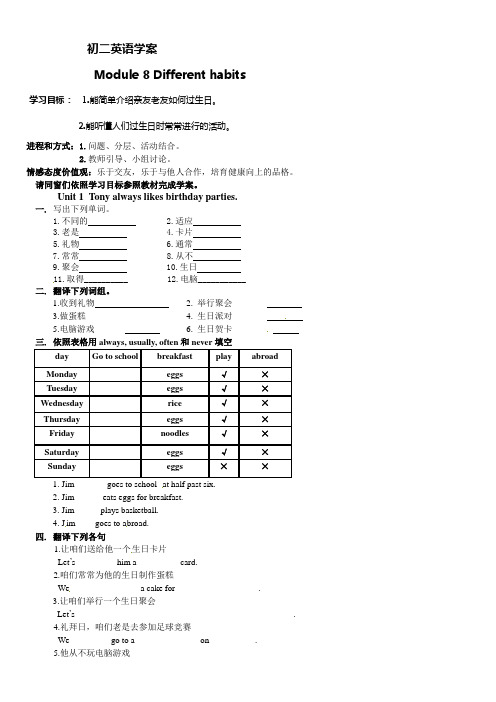
初二英语学案Module 8Different habits 学习目标: 1.能简单介绍亲友老友如何过生日。
2.能听懂人们过生日时常常进行的活动。
进程和方式:1.问题、分层、活动结合。
2.教师引导、小组讨论。
情感态度价值观:乐于交友,乐于与他人合作,培育健康向上的品格。
请同窗们依照学习目标参照教材完成学案。
Unit 1Tony always likes birthday parties.一. 写出下列单词。
1.不同的2.适应3.老是4.卡片5.礼物6.通常7.常常 8.从不9.聚会 10.生日11.取得__________ 12.电脑___________二. 翻译下列词组。
1.收到礼物2. 举行聚会________3.做蛋糕_______________4. 生日派对________5.电脑游戏______6. 生日贺卡_________三. 依照表格用always, usually, often和never填空day Go to school breakfast play abroadMonday eggs √×Tuesday eggs √×Wednesday rice √×Thursday eggs √×Friday noodles √×Saturday eggs √×Sunday eggs ××1. Jim _______goes to school at half past six.2. Jim______ eats eggs for breakfast.3. Jim _____ plays basketball.4. J im____ goes to abroad.四. 翻译下列各句1.让咱们送给他一个生日卡片Let’s_________ him a _________ card.2.咱们常常为他的生日制作蛋糕We_______ ________ a cake for _____ _____________.3.让咱们举行一个生日聚会Let’s _________ _____________ _____________ _____________.4.礼拜日,咱们老是去参加足球竞赛We_________ go to a _______ _______on __________.5.他从不玩电脑游戏He _______ plays_______________Unit 2 His birthday present is a cinema ticket一. 依照中文写出英文单词1.票2. 软运动鞋3.牛仔裤4.音乐会5.盒子6. 丝绸7.衬衫________ 8. 音乐_________9.杂志__________ 10.小说______ _二. 翻译下列词组。
初中英语七年级Module 8 Different habits单元复习教案
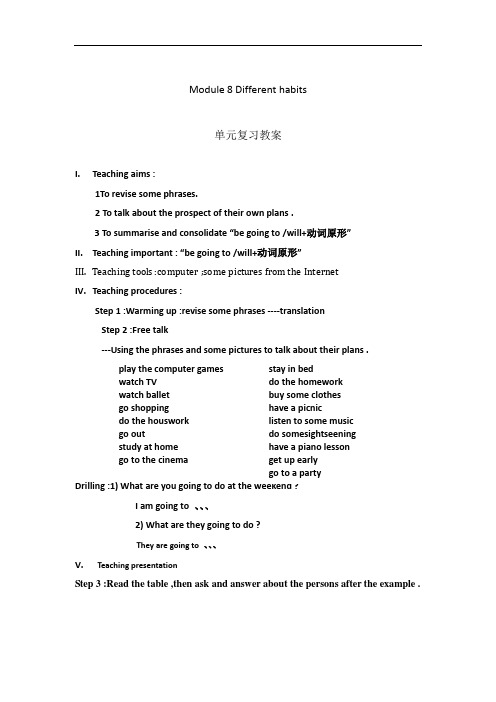
Module 8 Different habits单元复习教案I.Teaching aims :1To revise some phrases.2 To talk about the prospect of their own plans .3 To summarise and consolidate “be going to /will+动词原形”II.Teaching important : “be going to /will+动词原形”III.Teaching tools :computer ;some pictures from the InternetIV.Teaching procedures :Step 1 :Warming up :revise some phrases ----translationStep 2 :Free talk---Using the phrases and some pictures to talk about their plans .I am going to 、、、2) What are they going to do ?They are going to 、、、V.Teaching presentationStep 3 :Read the table ,then ask and answer about the persons after the example .e.g A :What’s Daming’s aunt going to do next Sunday ?B :She’s going to go to the zoo .A :Why is she going to go to the zoo ?B : Because she likes animals .Step 4 :Listen to the tape and check what Lingling and Tony are going to do ?Step 5 : Using will /won’t to write sentences about the future .e.g The roads /be /very crowdedThe roads will be very crowded .1.So car journeys /be /easy .2.Fuel /be /expensive .3.So internation travel / not be /very cheap .puters and machines /do /all the heavy and boring work .5.So we /have /more time to play and have holidays .nguage practice /consolidation .Step 6:Do some exercises and check themVII.Summary and homework。
外研版七上Module8Differenthabits1
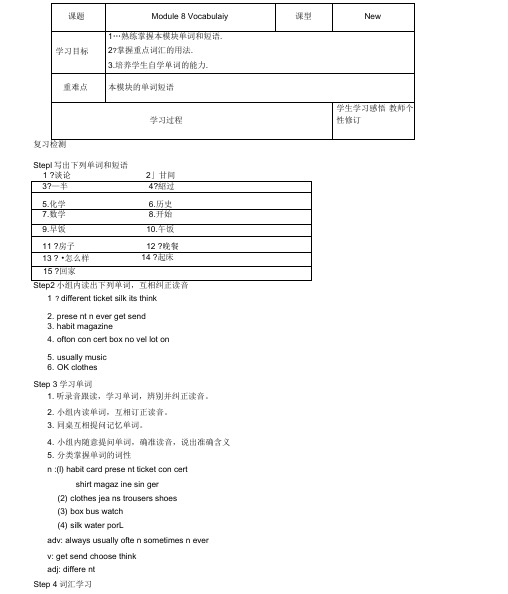
复习检测Stepl写出下列单词和短语Step2小组内读出下列单词,互相纠正读音1 ? different ticket silk its think2. prese nt n ever get send3. habit magazine4. ofton con cert box no vel lot on5. usually music6. OK clothesStep 3学习单词1. 听录音跟读,学习单词,辨别并纠正读音。
2. 小组内读单词,互相订正读音。
3. 同桌互相提问记忆单词。
4. 小组内随意提问单词,确准读音,说出准确含义5. 分类掌握单词的词性n :(l) habit card prese nt ticket con certshirt magaz ine sin ger(2) clothes jea ns trousers shoes(3) box bus watch(4) silk water porLadv: always usually ofte n sometimes n everv: get send choose thinkadj: differe ntStep 4词汇学习学习下列短语,明确含义,并牢记,小组内互相随意提问6 watch football 8 at once 10 play the pia no1 aopsaorf = a lot of4f on televisi on3 th 5nmake a cake for his birthday7 send him a birthday card9 have a birthday party 1 always usually ofte n someti n ever 这mes 几个单词是频 率副词•常用于一般现在时。
读下而的句子,注意斜体字的位置(1) 1 always get up at 6:00.(2 ) She usually goes to sleep at 9:00.(3 ) He often watches TV in the evening ?(4 ) They sometimes watch football match on Sun day.(5) He n ever plays computer games?这类频率副词常置于实义动词之前,在助、系动词之后2. get, reach , arrive get本意为"获得"get to = arrive in-at =reach 是"到达‘之意⑴ He often gets to school at 7:00.(2) I reach the, hospital at 9:oo yesterday(3) He arrived in Shanghai yesterday.【温馨提示】 'get there 到那儿,get to school 到校(注意何时带io)(二)短语延伸1 ? a pair of + glasses, trousers, shoes, jeans2 . lots of/a lot of +可数名词或不可数名词many +可数名词复数much 十不可数需词some +可数名词或不可数名词There are lots of workers in the factory. There are many workers in the factory.r There is much milk in the glass.I have some juice ?3 ? send/give sb.sth. = send/give sth. to sb.buy/make sb.sth = buy/make sth. for sb.Eg: give him a book = give a book to him make her a card = make a card for her当堂达标练习一写出下列词汇1.不同的 _______________2.习惯 _______________3?总是 ________________ 4.礼物 ________________5.通常 ________________6.经常 _________________7.从不&得到9.双.对10.牛仔裤11 ?盒子12.丝绸13 .衬衫14.杂志15.小说16?诜择二词型转换1. habit (复数)2. prese nt 复数)uallv (近义词)4.sc nd (三单)5? il (名词性物主代词) 6.choosc (三单)7.think (三单)& box (复数)9.get (三单)10.si ngerf 复数)三翻译下列短语.1. 一条.一双 3.思考,认为2 ?许多?大量的4.为他的生日制作一个蛋糕5•给他发送一张生日贺卡6. 观看足球比赛7. 举行一场生日聚会&弹钢琴9.去音乐会四阅读理解(判断正T误F)Tom's father was ill. It was Saturday. Tom was on the way to the hospital to see his father. The hospital jvas very far. so he had to take a bus.When he got to the bus stop, he saw many people there They were sta nding in line and wait ing for a bus. The bus was late. Tom did n't want to stay in this queue? He wejit to the front and stood there?One of tlie people said to him: " You must n't jump the queue, boy."With a red face Tom said sorry and went to the end of the line. Soon the buscame. All the people got on the bus? ()1. Tom was at the bus stopto see his father.()2. A lot of people were going to take a bus to the hospital.()3. When he got to r the bus stop, Tom wanted to be the first one to get on the bus?()4. When Tom jumped the queue, one of the people pushed himback.f)5. Tom waited until another bus came to the bus stop?。
- 1、下载文档前请自行甄别文档内容的完整性,平台不提供额外的编辑、内容补充、找答案等附加服务。
- 2、"仅部分预览"的文档,不可在线预览部分如存在完整性等问题,可反馈申请退款(可完整预览的文档不适用该条件!)。
- 3、如文档侵犯您的权益,请联系客服反馈,我们会尽快为您处理(人工客服工作时间:9:00-18:30)。
Module 8 Choosing presentsUnit 1 I always like birthday parties.在课文中找出下列词组:收到生日礼物_______________举办一个聚会_______________做一个蛋糕_______________送给他一张生日卡片_______________听音乐_______________去看足球比赛_______________打篮球_______________一个好主意_______________观察思考:send sb sth = _______________________give sb sth = _______________________buy sb sth = _______________________let sb后接_________________________当主语为第三人称单数时,谓语动词用__________________尝试:1、Let’s send him a birthday card.(变为同义句)Let’s send _______ _______ _________ _______ ________ .2、I usually give her a present. ( 变为同义句)I usually ________ ________ _______ _______ _______ .3、Let me __________ (make ) a cake for you.4、My mother usually ________ (make ) a cake for my birthday.5、She often _______ (get ) presents on her birthday.综合练习一、单项选择1、________ like oranges and apples .A. MaryB. HeC. TheyD. Tom2、Tom _______ English in the morning .A. lovesB. singsC. readD. reads3、—_______ is Tony’s birthday ?— On Sunday .A. WhatB. HowC. WhenD. Who4、—______your father like swimming ?—No , he doesn’t . He ______fishing .A. Does , likesB. Do, likeC. Does , likeD. Is , likes5、How many ______ can you see in the picture ?A. boxsB. bookesC. manD. women6、She usually goes to school early and she’s _______ late for school .A. alwaysB. oftenC. usuallyD. never7、He would like to make a cake ______ you .A. fromB. toC. forD. of8、Give the book _______ me , please .A. onB. toC. ofD. in9、It’s five o’clock . Let’s ________ now .A. go to thereB. goes there C . go there D. going there10、He often _______ a football match .A. look atB. looks atC. watchD. watches二、根据句意和首字母写出单词1、Wang Dong u ________ gets a card for his birthday .2、He a ________ watches TV in the evening .3、His birthday p _______ is a new bike .4、Let’s s _______ him a card on his birthday .5、They n _______ listen to music on Saturday .6、Different people have different h ______ .三、用所给单词的适当形式填空1、______ your mother ________ (work ) in a school ?2、Mike ______ (get ) up early every day .3、She _______ often _______ (not go ) to school late .4、She _______ (live ) in a house near here .5、Let me ______ (help ) you .6、She usually ________ (go ) to school by bike .7、It’s time for class . Let’s _______ (go ) into the classroom .8、Betty often _______ (send ) me school things .9、Sunday is the _______(one )day of a week .10、Let’s give ______(he )a CD .四、情景会话A . What about Gone with the Wind?B . let’s buy a CD for her.C . She likes reading books.D . Do you think that is good?E . What books does she like reading?F . How about War and Peace?G . I like them , too.A :Tomorrow is Mother’s Day. Let’s buy a present for her.B :___1___A :No , she never watches CD.B :____2____ Let’s buy her a book.A :That’s a good idea ! ___3___B :She likes reading something about history.A :____4____B :That’s a good book, but she never likes wars.A :____5____B :That’s a good book for her.1、_______2、_______3、_______4、_______5、______Unit 2 She often goes to concerts.预习课文,找出下列短语一盒巧克力__________________一张光盘__________________一张电影票__________________一张音乐会票__________________一本杂志__________________一本小说__________________一条牛仔裤__________________一件丝衬衫__________________一件T恤衫__________________一双运动鞋__________________去看电影__________________听音乐会__________________弹钢琴__________________听音乐__________________尝试:1)My father likes _________ (watch )football matches.2) He ________ (like ) films and he often _____ (go ) to the cinema.3)He plays the piano and likes to sing .(改为否定句)He ______ ______the piano ________ ______ to sing.分段细读课文,了解每个人的喜好,为其挑选礼物。
1)Daming’s uncle :___________________________________________ His birthday present is ________________________________________ .2)Daming’s mother :___________________________________________ Her birthday present is _________________________________________3)Tony’s sister :___________________________________________Her birthday present is_________________________________________4)Lingling’s father :___________________________________________ His birthday present is__________________________________________5)Betty’s aunt and uncle :________________________________________Their birthday presents are __________________________________________写作练习在日常生活中,有许多有趣的事可做,你喜欢做什么?你的朋友喜欢做什么?你了解吗?请调查一下,完成下面的表格,然后写一篇短文描述一下你和你的朋友。
Things you likeThings you doYouYour partnerMy partnerMy partner’s name is … She likes playing the piano. She often plays it after school …Homework:你的家人有什么喜好,过生日时选择什么礼物,以“Choosing birthday presents for my family ”为题,写一篇短文。
